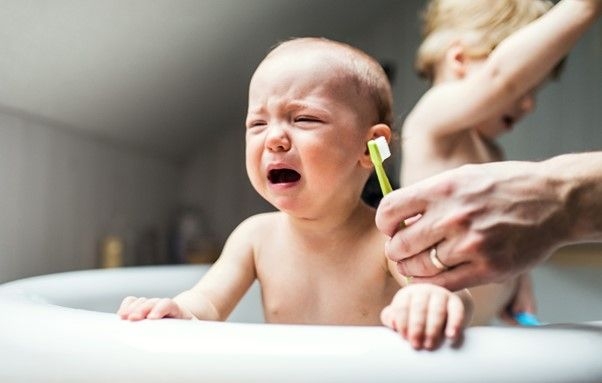Keeping a baby clean is usually less time-consuming than it is for older children or adults, because newborns and infants don’t get as dirty as toddlers and young children. Newborn skin is particularly sensitive, so you don’t need to wash your little one as often as you may think. Here are some tips on keeping your baby’s skin and hair in good shape.
Skincare
Bathing
Two to three baths a week will likely be enough for infants. Use warm water in the sink or a small tub. Naturally, you will need to hold your little one when in water, but be sure to always keep an eye and a hand on your baby during bathtime.
Avoid soaps and opt for gentle baby cleansing products. You can use a soft sponge or cloth to wash your little one. Keep in mind their skin is delicate, so use a gentle rubbing or patting motion. Remember to get in the folds and nooks: behind the ears, between the fingers, around the nappy area.
Apply a sensitive moisturiser after bathing to help keep skin from drying out, but be sure to avoid the eye area. Moisturising is a good time for a baby massage, which may also help the baby feel safe, settled, and more connected to you.
Suncare
Babies under six months are best protected from the sun by covering up. This means wearing sleeves, hats, pants, and seeking shade. Sunscreen is not recommended under 6 months of age. You can find more information about sun safety for babies here.
Rashes
Rashes can occur anywhere on the body, but they are particularly common in the nappy area. Prevent nappy rash by changing frequently, and immediately after a poo. Pat dry the area thoroughly. When you can, let your little one’s nappy area ‘breathe’ before applying cream and a new nappy.
If your baby develops rashes on other body parts or struggles with a severe and persistent nappy rash, seek advice from your doctor or pharmacist.
Hair
When your tot does start growing hair, it can be quite easy to manage with a comb or soft bristle brush. Be mindful of their soft scalp. Cradle cap is the flaking of scalp skin. Cradle cap brushes can help remove some of these ‘scales’. You can also talk to your GP about managing cradle cap.
Teeth
If your baby does not have any teeth, it is very simple to keep their mouth clean. Place a clean, warm washcloth over your finger and softly run it along the inside and outside of the baby’s gums. This won’t take long and only needs to be done a couple of times a day.
Once your little one is teething, find a small, soft baby toothbrush. Use gentle circular motions, focusing on a small area at a time. Avoid using bristles on gums at this stage. You won't need toothpaste until around 18 months of age. Keep this brush clean and replace it regularly.
Nails
Babies are born with nails and you might find they’re accidentally scratching you or themselves. Baby nails can be trimmed, even though they might seem so soft and precious that you’re reluctant to bring clippers or scissors to them.
Hold baby’s hand firmly in your own, in a well-lit and calm environment. Point their finger away from you so to best see what you’re doing.
It might feel like there’s a lot to remember when it comes to baby grooming, but it only gets easier over time!



